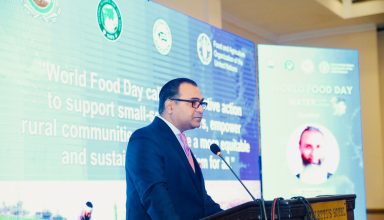PDA & FAO-UN Celebrates World Food Day 2023: Advocating Water’s Vital Role in Milk Production

LAHORE: The Pakistan Dairy Association (PDA), in collaboration with the Food and Agriculture Organization (FAO) and Punjab Food Authority, commemorated World Food Day 2023, with a focus on the critical role of water in milk production.
World Food Day (WFD), celebrated every year on October 16th, marks the founding of the Food and Agriculture Organization of the United Nations in 1945. It serves as an annual reminder for global communities to raise awareness and take steps toward transforming our food systems.
The theme for this year, “Leave no one behind. Water is Life, Water is Food,” highlights the essential role of water in agriculture, food production, and the well-being of communities.
In this year’s World Food Day event, the Pakistan Dairy Association aligned itself with the international community, emphasizing the theme, “Water is Life: Water is Food.” PDA, responsible for the welfare of dairy farmers and ensuring the production of safe dairy products in Pakistan, acknowledged the pivotal role of water in milk production and its profound significance as a vital source of nourishment.
Water is an elemental component of milk production, influencing the safety and quality of dairy products. Dr. Shehzad Amin, the Chief Executive Officer of the Pakistan Dairy Association, highlighted the profound impact of water on this vital sector.
PDA recognizes the critical importance of sustainable water management practices in ensuring the production of safe and nutritious milk. The responsible use of water is vital to support the well-being of dairy animals, enhance milk production, and maintain the overall quality of dairy products.
The event featured an array of distinguished speakers, including academia, industry experts, food regulatory authorities, and policymakers. They engaged in enlightening discussions during the national seminar for World Food Day 2023. The key points of their discussions included:
Water, often referred to as “blue gold,” is irreplaceable in sustaining life on our planet. In the context of food production, it plays a pivotal role, particularly in the production of milk, a valuable source of essential nutrients for human consumption. Milk, comprising approximately 87% water, underscores the vital contribution of water to its composition and nutritional value. The quality and availability of water have a substantial impact on milk production, affecting aspects such as animal hydration, feed cultivation, and dairy processing. Notably, a cow requires around 600-800 liters of water to produce a single liter of milk, encompassing both cow consumption and feed cultivation. This underscores the paramount importance of water in this context.
The quality of water used in dairy and food processing is of paramount importance. Contaminated water can introduce pathogens and pollutants into the food chain, posing severe health risks to consumers. Ensuring access to safe and clean water throughout the food production cycle is pivotal for preserving public health. Additionally, agricultural practices, particularly irrigation, heavily rely on water resources. Water scarcity can jeopardize crop yields and the nutritional quality of produce, directly affecting food security. Simultaneously, insufficient access to safe water and proper sanitation poses a significant threat to human health, contributing to malnutrition and disease.
The event featured prominent speakers, including Mr. Rana Awais Khan, Chairman of the National Alliance for Safe Food, and Dr. Shehzad Amin, the CEO of the Pakistan Dairy Association. Dr. Amin passionately emphasized that water is essential for life on Earth. Over 50 percent of the human body is composed of water, and approximately 71 percent of the Earth’s surface is covered by water. However, a mere 2.5 percent of the world’s water is fresh and suitable for various uses, including drinking, agriculture, and industrial applications. Water is a fundamental force shaping the destinies of people, economies, and nature, forming the foundation of our food systems.
Agriculture is the primary consumer of global freshwater, accounting for 72% of total withdrawals, while 16% serves municipalities and 12% caters to industries. With 2.4 billion individuals residing in water-stressed regions and 10% of the global population in countries with high and critical water stress, there is a pressing need for equitable water distribution. The expected 35% increase in global water demand for agriculture by 2050 underscores the need for responsible water management.
Concerningly, over 80% of the world’s wastewater is released into the environment without adequate treatment. Furthermore, about 74% of all disasters between 2001 and 2018 were water-related, resulting in nearly USD 700 billion in economic damage. Dr. Tallat Naseer Pasha, Vice-Chancellor of the UAE, highlighted these alarming facts.
Dr. Muhammad Nasir, an industry expert representing FrieslandCampina Engro Pakistan, presented on the theme “Dairy as a Wholesome Food – An Approach to Produce Safe Food to Build a Safe Nation.” The presentation stressed the need for producing safe and healthy dairy products not only to combat malnutrition and stunted growth in Pakistan but also to substantially reduce the nation’s healthcare expenditure.
Dr. H. U. Khan, Director General of PSQCA, reiterated the critical importance of implementing food safety standards to safeguard public health and maintain the quality and integrity of the food supply chain.
A notable announcement came from FAO Pakistan, which officially launched the “Clean Indus” campaign. This campaign aims to raise awareness about the vital importance of preserving the Indus River, focusing on reducing water wastage and improving water quality—two crucial factors for optimizing food production. The “Clean Indus” campaign is anticipated to inspire action to protect this invaluable natural resource.
Dr. Zaffar Mehmood, Food Safety Specialist at FAO, emphasized the message that “Leave No One Behind: Water is Food and Water is Life.” He highlighted the need for responsible environmental stewardship to safeguard Pakistan’s precious water resources, ensuring a sustainable and prosperous future for all. The session underscored the indispensable role of clean water in sustaining lives and ensuring the success of agricultural endeavors.
The event emphasized the significance of food safety in ensuring the health and well-being of individuals. Practices and procedures aimed at preventing, handling, and mitigating risks associated with food consumption were focal points of discussion. This comprehensive approach, from farm to table, incorporates various measures to uphold the safety and quality of food. It includes proper handling, storage, preparation techniques, and strict adherence to hygiene standards in food production and processing facilities. Regular inspections, testing, and monitoring are integral components of this effort, aimed at detecting and addressing potential hazards such as contamination by bacteria, viruses, chemicals, or allergens. Mr. Raja Jahangir Anwar, Director General of the Punjab Food Authority, fervently championed the cause of food safety, emphasizing its role in protecting consumers from foodborne illnesses and fostering a healthier society.
The paramount importance of water in agriculture cannot be underestimated. It plays a critical role in the growth and productivity of crops. A reliable and adequate water supply is the cornerstone of agricultural success, ensuring essential processes such as germination, photosynthesis, and overall plant development. Water resources are indispensable for irrigation, particularly in areas with insufficient or unreliable rainfall. The absence of a dependable water source poses significant challenges for farmers, leading to reduced yields and economic losses. source: biztoday

